
Protests across Georgia over the government’s decision to freeze the EU accession process have continued for a sixth night.
In the capital Tbilisi, the demonstration on Tuesday again continued into the early hours, as protesters battled riot police for control of the central Rustaveli Avenue.
Police continued to deploy tear gas and water cannons and to make arrests, with police several times caught on camera beating protesters as they were detained.
There were unconfirmed reports that the authorities had unofficially banned the sale of fireworks, which protesters have used to fight back against riot police.
One of the protesters injured during the previous night’s demonstration, 22-year-old Aleksi Tirkia, reportedly underwent emergency surgery after being struck in the head with a tear gas canister. On.ge quoted his attending physician as stating that he was admitted with an open scalp wound and remains in a medically induced coma.
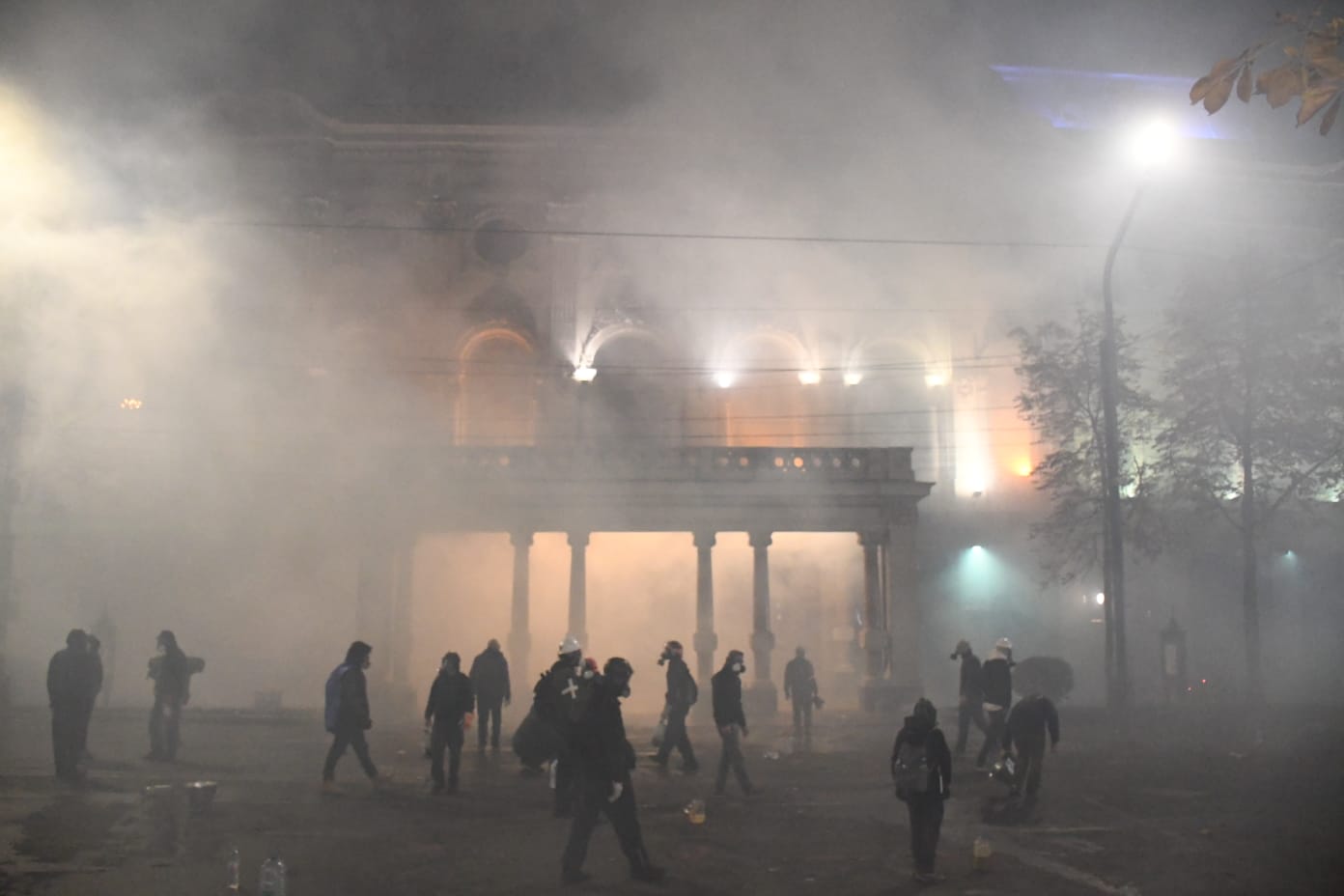
On Tuesday, UN Human Rights Chief Volker Türk joined the mounting condemnation of the government’s crackdown on protesters as well as the targeting of journalists by police.
‘The use of unnecessary or disproportionate force against protesters and media workers is extremely worrying’, Türk said.
He also commented on the lack of ID tags or identification on the masked officers policing the protests.
Giorgi Gakharia, a former Georgian Dream Interior Minister and Prime Minister and now the leader of the opposition For Georgia party, suggested that the government may be hiring informal and private groups to carry out violence against protesters.
‘It seems that the masked individuals have been granted impunity, allowing them to commit acts of violence and engage in looting to such an extent that they take personal belongings, phones, bags, and other belongings from injured and beaten victims’, he said.
The Public Defender’s office on Tuesday accused the police of torturing detained protesters.
‘In most cases, [detained demonstrators] sustained serious injuries to the face, eyes, and head’, they said. ‘The location, nature, and extent of the injuries create a credible impression that the police are using violent methods against citizens for the purpose of punishment’.
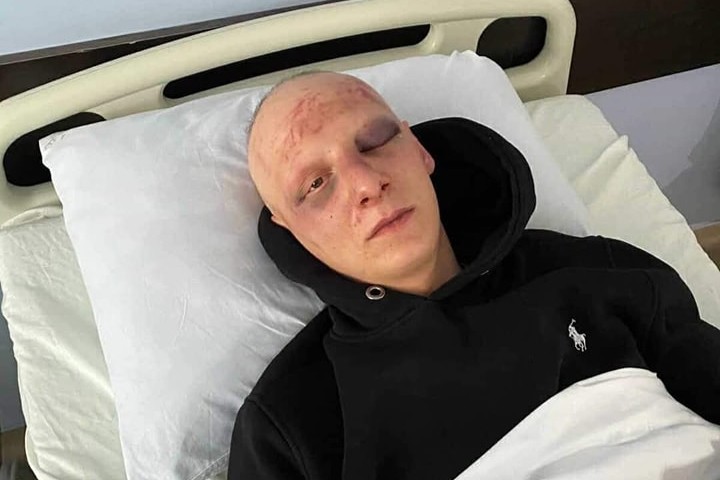
The Media Freedom Rapid Response (MFRR), a mechanism to monitor and react to violations of press freedom in EU members and candidate countries, reported that at least 50 journalists had ‘experienced physical attacks, verbal abuse, or obstruction’ by police.
‘This brutal crackdown on the media in Georgia is not an isolated episode but is part of a disturbing pattern of targeted violence and impunity for crimes against journalists’, they said.
‘The international community must demand that the Georgian government ends its crackdown on the press and upholds its commitments to democratic freedoms and freedom of expression.’
During the protests, riot police have attempted to forcibly detain OC Media Co-director Mariam Nikuradze, and have caused damage to multiple cameras.
Criticism of the government has continued to come in from public servants and others.
On Tuesday, around 150 employees at the Revenue Service signed a joint statement distancing themselves from the government’s decision to halt the country’s EU membership bid, stating that they ‘remain faithful to the Constitution of Georgia and the course of integration into the European Union’.
Prime Minister Irakli Kobakhidze responded to the criticism from across state agencies on Tuesday by threatening repercussions, describing their protests as a ‘self-cleansing’ of the public service.
‘We have been observing everyone’s actions and will respond. The response will be in accordance with the Constitution and the law, but there will be a response — I say this with full responsibility’, Kobakhidze vowed.
Kobakhidze also said the ‘leaders of wealthy NGOs’ would likewise ‘not escape their responsibility’ for allegedly financially helping protesters.
School students also continued to conduct walkouts on Tuesday, in schools in Kutaisi, Batumi, Zugdidi, Rustavi, and Akhaltsikhe.
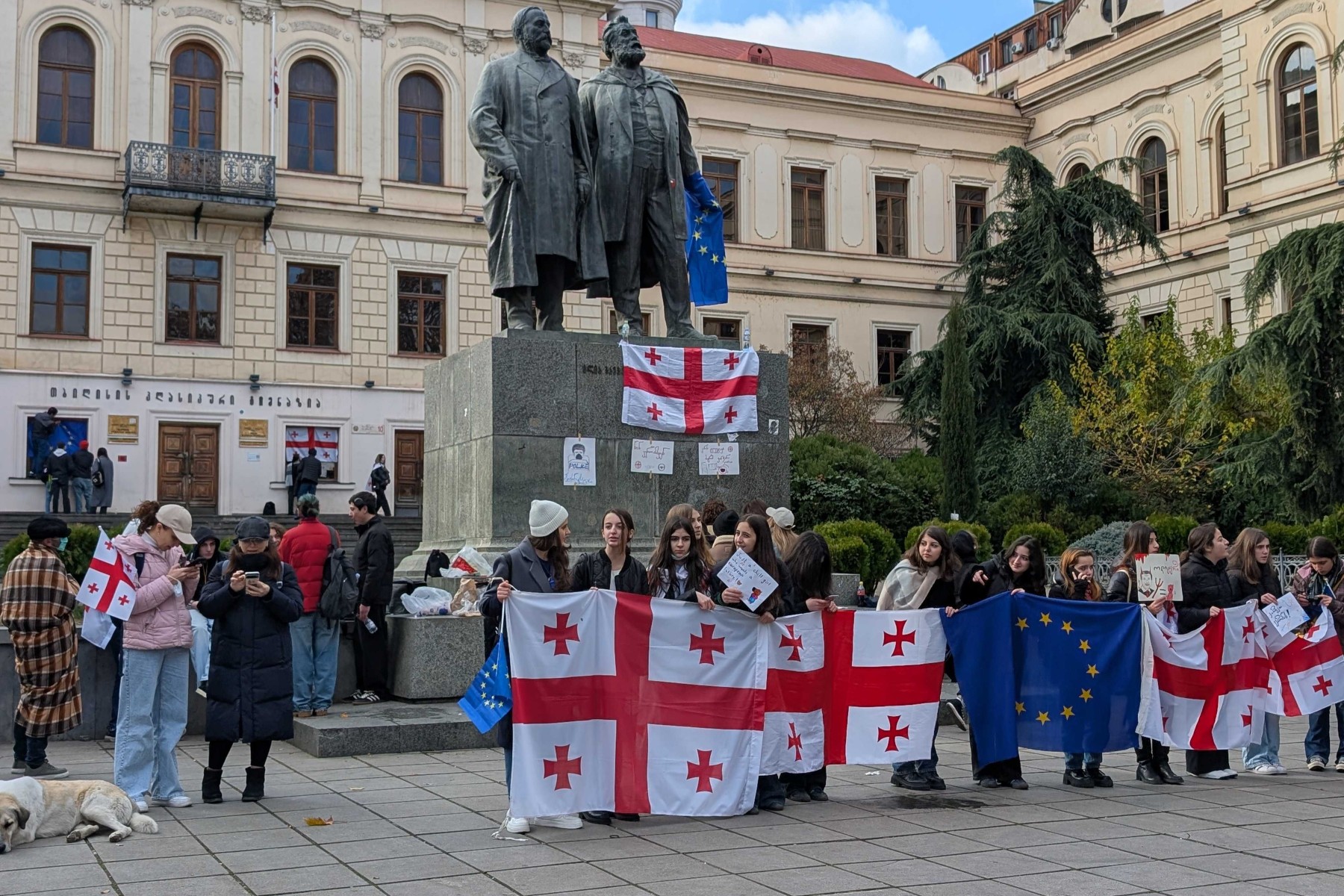
Local TV channel 25 aired footage reportedly filmed at the 18th Batumi public school in which a woman, allegedly a member of staff, attacked students attempting protest.
The Education Ministry responded to the walkouts by asking for tip offs on any attempts to ‘interrupt the education process’.
Georgian President Salome Zourabichvili suggested the move resembled the widespread use of informers during the Soviet Union.
‘Ministry of education puts out a hotline for informers about those who disturb the teaching process… USSR is back?’, she asked.
Also on Tuesday, Georgia’s Constitutional Court, widely believed to be subservient to the ruling party, dissmissed a lawsuit submitted by the President and opposition parties against the 26 October Parliamentary elections.
Local observers and media organisations documented widespread voter fraud and voter secrecy violations during the vote.
There were two dissenting opinions, both of which were based on concerns regarding the availability of participation in the elections for voters living abroad.
‘The Constitutional Court has passed a verdict on both the country and itself’, Zourabichvili said in response.
She said it would have taken three justices to ‘stand true to their conscience and their duty to the country’.
She accused the billionaire founder of Georgian Dream, Bidzina Ivanishvili, of occupying all branches of the government in Georgia except of hers.
‘There remains one constitutional, legitimate institution, and that is me, and this is a very great responsibility. On the other side, there is one person who has fully usurped power in this country — I do not use the word “government”, but “power” — and has established a violent regime. That person is Ivanishvili’, she added.
Tuesday also saw further international condemnation of the government.
The UK Minister of State for Europe, North America, and the Overseas Territories, Stephen Doughty, condemned ‘the continued use of brutal and excessive force against protestors and journalists that has continued over recent days’.
The government, however, has remained defiant. On Tuesday, the Foreign Ministry summoned the ambassadors of Lithuania and Estonia as well as the Charge d’Affaires of Latvia to express ‘concern’ over the announcements by the three countries of sanctions against Georgian government officials and law enforcement officers.
‘The Georgian side finds unacceptable the statements aimed at influencing the activities of sovereign state institutions, which are perceived as interference in the internal affairs of the country’, they said.
Estonia, Latvia, and Lithuania have banned entry to 11 Georgian officials — including Georgian Dream founder Bidzina Ivanishvili and Interior Minister Vakhtang Gomelauri — over human rights violations.
The latest wave of protests began on 28 November, when Georgian Dream announced they were halting EU accession efforts.



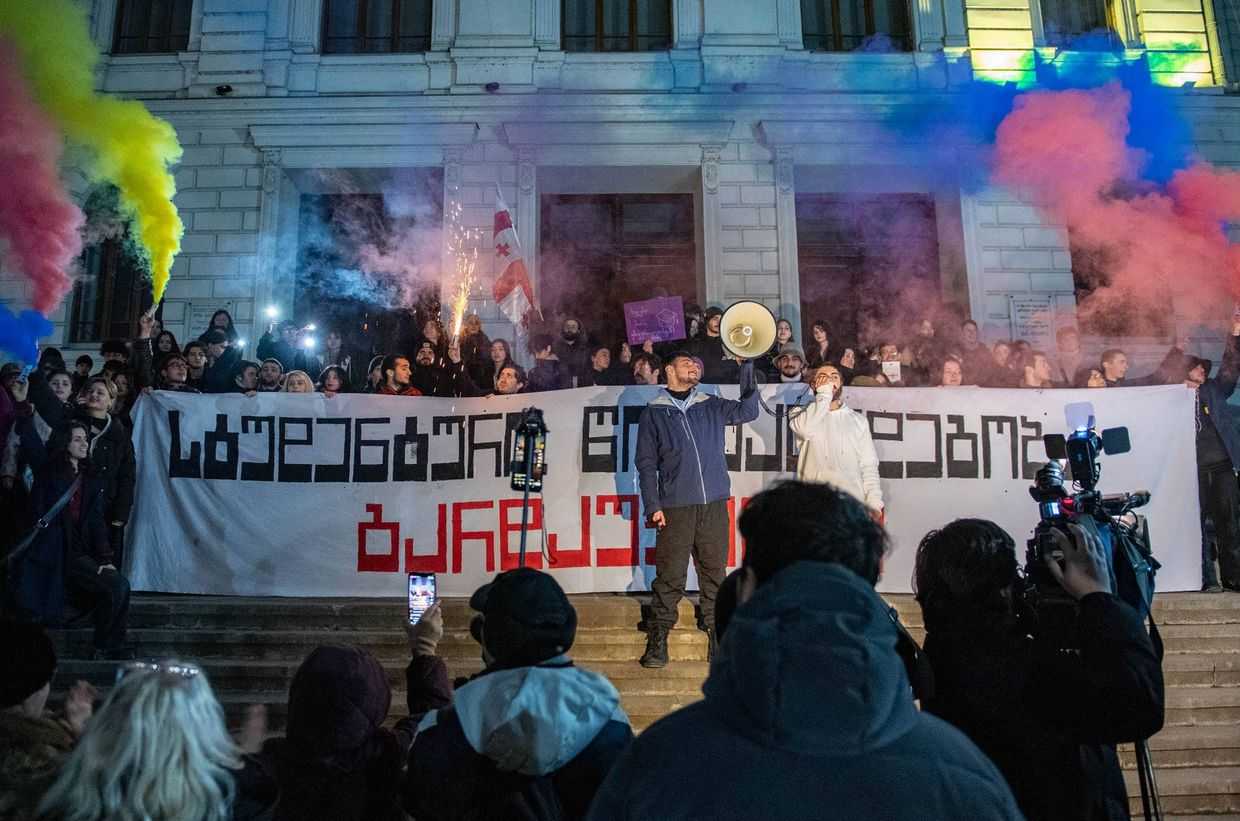
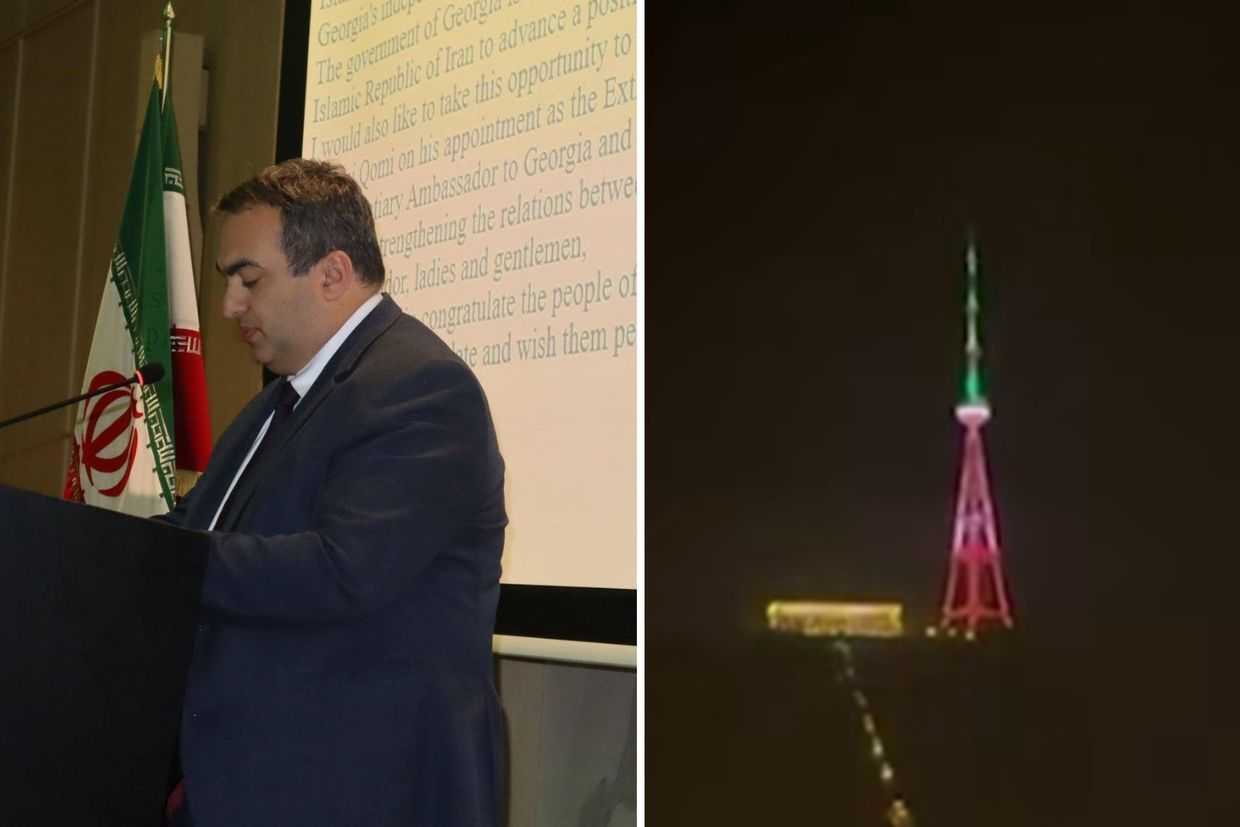

![Baia Margishvili standing in central Tbilisi with a sign reading: ‘The Prosecutor’s Office [is] a punitive squad. How many more innocent people will you put in prison?’ Photo: Mariam Nikuradze/OC Media.](/_next/image/?url=https%3A%2F%2Fassets.bucket.fourthestate.app%2Foc-media-prod%2Fcontent%2Fimages%2F2026%2F02%2Fcalls-for-sanctions-and-raids-19-10-25-48.jpg&w=3840&q=50)


